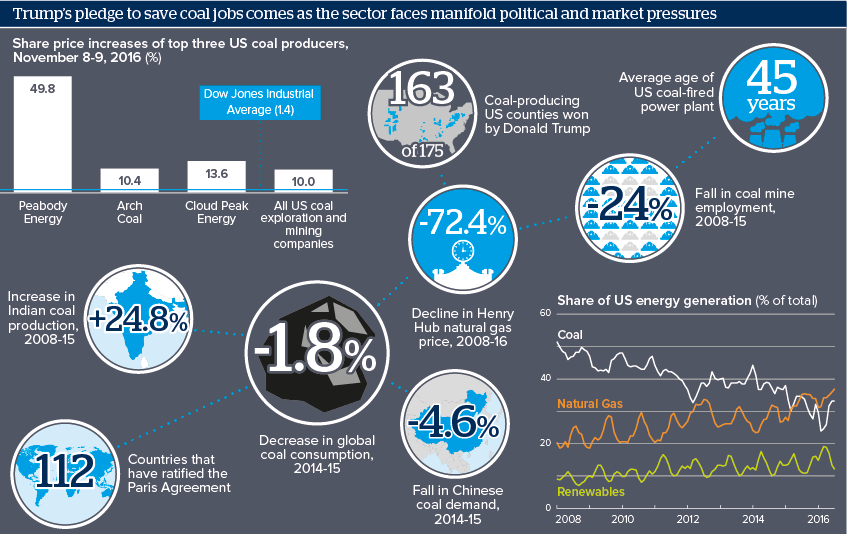Coal sector symbolism will shape US energy policy
President-elect Donald Trump has vowed to end his predecessor's 'war on coal' despite the industry's structural decline
Source: Bloomberg, BP Statistical Review of World Energy, EIA, Rhodium Group, Dow Jones Wilshire US Coal Index, Oxford Analytica
Outlook
President-elect Donald Trump has pledged to end "job-killing restrictions" on the US coal sector once he comes into office on January 20, 2017, and undertake the process of rolling back Obama's Clean Power Plan via legislation and executive branch fiat.
This symbolic bid by Washington to protect blue-collar mining jobs in defiance of the environmental concerns of political and economic elites will lead to backsliding by the United States on global climate change mitigation efforts, rendering the Paris Agreement's 2100 warming targets unrealistic.
However, the structural pressures of existing domestic regulation, lower overseas demand, cheap natural gas and declining costs for renewable energy production mean that there is little the president-elect and Republican Congress can do to arrest Coal Country's decline.
Impacts
- The Democrats will struggle to reconcile their traditional working-class base with the environmental goals of its metropolitan backers.
- Canada's plan to close coal-fired plants will be easier to enact, as the ruling Liberals do not depend politically on coal-producing areas.
- Piecemeal Chinese efforts to reduce steel sector overcapacity and greenhouse gas emissions could see coal prices become more volatile.
- Reduced US climate efforts could strain diplomatic ties with more activist countries and boost Beijing's international standing.
See also
- Legal hurdles and cheap gas will foil US coal plans - Oct 17, 2017
- Trump's Paris moves reflect policy disruption risks - Jun 2, 2017
- Courts will slow Trump's push for energy deregulation - May 10, 2017
- US backsliding will overshadow Bonn climate talks - May 5, 2017
- US industrial metals see bullish but high-risk outlook - Feb 17, 2017
- Structural weaknesses hinder the coal price outlook - Dec 13, 2016
- Prospects for US politics in 2017 - Nov 23, 2016
- Markets will trump policy to shape US energy mix - Nov 15, 2016
- More graphic analysis
